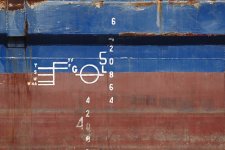Yes. And ships lay lower in warm water ;-)
Jan
except for water between 0 and 4° C 😀
As far as I know, ships are measured according to their displacement. I.e., a 100-ton ship will displace 100 tons of water. It has practically no relation to the actual weight of the ship.
Tom
According to wiki the long ton is also called the imperial ton or displacement ton and it seems the US navy uses it as the latter when describing their ships.
"In the United States, a short ton is usually known simply as a "ton",[1] without distinguishing it from the tonne (1,000 kilograms or 2,204.62262 pounds), known there as the "metric ton", or the long ton also known as the "imperial ton" (2,240 pounds or 1,016.0469088 kilograms). There are, however, some U.S. applications where unspecified tons normally means long tons (for example, naval ships)[2] or metric tons (world grain production figures).
Both the long and short ton are defined as 20 hundredweights, but a hundredweight is 100 pounds (45.359237 kg) in the US system (short or net hundredweight) and 112 pounds (50.802345 kg) in the imperial system (long or gross hundredweight)"
Of course the most important unit of volume is the hectolitre (100L) as that is the unit in which German breweries measure their output. 😉
You've got that the wrong way round, Jan. 🙂Gravity drops a bit if you go towards the poles as the earth is a bit flattened.
You actually weigh about 1% less at the equator, a combination of being further from the centre of the Earth and centrifugal force.
So setting high jump or pole vault records should be easier on mountains near the equator, right?
It makes perfect sense to avoid confusion between energy (E), electric field strength (E) and electromotive force (ℰ).The electromotive force can be expressed using ANY symbol/letter, as long as it is defined within the scope of a text or formula.
We would also have to factor in the effect of oxygen availability on those mountains. 🙂So setting high jump or pole vault records should be easier on mountains near the equator, right?
Yes. And ships lay lower in warm water ;-)
Jan
Also why divers (off platforms into pool of water kind of diver) practice with bubbles released into the water just before diving. It's less dense and less impact when you hit the water.
To integrate with the theme of the thread, there's lots of abbreviations on Plimsoll lines!Yes. And ships lay lower in warm water ;-)
Attachments
You've got that the wrong way round, Jan. 🙂
You actually weigh about 1% less at the equator, a combination of being further from the centre of the Earth and centrifugal force.
Ahh yes, of course, it is flattened at the poles thus thicker at the equator!
Jan
I am not sure if this is a joke or if you missed my point (badly).It makes perfect sense to avoid confusion between energy (E), electric field strength (E) and electromotive force (ℰ).
And it is 10kHz, not 10KHz or 10khz or any other combination. k stands for kilo, Hz for Mr. Her[t]z.
Yep, k for kilo is always lower case, unlike all the other prefixes above 10^0.
1 Hz is one Hertz. Not one Hert.
About a cubic decimetre of water weighing 1 kg at 25 ºC at the equator: Doesn't it technically need to be in a normal atmosphere (101.325 kPa, 25 ºC, at sea level)?
Maybe we should discuss the boiling point of water too... 🙂 Where I'm at, water boils at 96.4 ºC.
Tom
You actually weigh about 1% less at the equator, a combination of being further from the centre of the Earth and centrifugal force.
Nah. You weigh the same but the normal force pulls less on you. You don't miraculously lose significant body mass by travelling to the moon either. No Elon Musk Weight Loss Program for you... 🙂
Tom
As far as I know, ships are measured according to their displacement. I.e., a 100-ton ship will displace 100 tons of water. It has practically no relation to the actual weight of the ship.
A ship will displace its weight in water. What other weight could it be?
Rating for tax and fees is based on the *volume of wine* inside.
"tonnage (volume) should not be confused with displacement (the actual weight of the vessel)" Tonnage - Wikipedia
Why are you being so combatitive?I am not sure if this is a joke or if you missed my point (badly).
This is a light-hearted thread. 😎
My point was simply that there is a very good reason for standardising the symbol for electromotive force in order to avoid confusion with other quantities with names beginning with 'e'. There should be nothing contentious with that.
Actually Tom, 1Hz is one hertz.1 Hz is one Hertz.
The rule is that, when written out in full, a unit corresponding to a person's name is not capitalised.
Perfectly correct, Tom. Your apparent weight is less! 😎Nah. You weigh the same but the normal force pulls less on you.
Also why divers (off platforms into pool of water kind of diver) practice with bubbles released into the water just before diving. It's less dense and less impact when you hit the water.
The sprinklers or bubbles are there so the diver can see the surface and so time their dive properly.
- Home
- General Interest
- Everything Else
- Those pesky Abbreviations!
